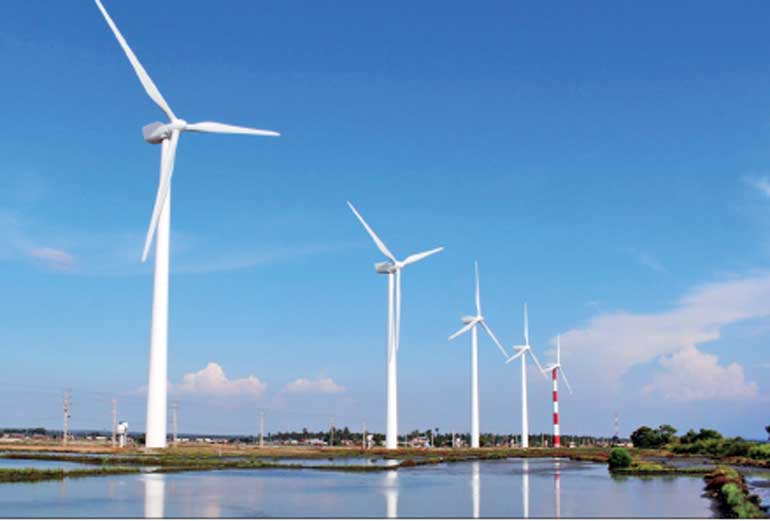Thursday Feb 19, 2026
Thursday Feb 19, 2026
Saturday, 25 February 2023 00:10 - - {{hitsCtrl.values.hits}}

For a successful and just energy transition, Sri Lanka needs a skilled workforce that is ready for new energy sources, technologies, and business models
 Shifting towards renewable energy in Sri Lanka could help to ensure a sustainable and reliable energy supply, stimulate economic growth, mitigate climate change, and contribute to national and international commitments. However, for a successful and just energy transition, the country needs a skilled workforce that is ready for new energy sources, technologies, and business models that align with the Paris Agreement and the Sustainable Development Goals. In addition to higher education, technical education and vocational training could play a key role in closing human resource gaps, meet the demands of the job market, reduce unemployment, and promote social equity.
Shifting towards renewable energy in Sri Lanka could help to ensure a sustainable and reliable energy supply, stimulate economic growth, mitigate climate change, and contribute to national and international commitments. However, for a successful and just energy transition, the country needs a skilled workforce that is ready for new energy sources, technologies, and business models that align with the Paris Agreement and the Sustainable Development Goals. In addition to higher education, technical education and vocational training could play a key role in closing human resource gaps, meet the demands of the job market, reduce unemployment, and promote social equity.
A just transition towards renewable energy
According to the Sixth Assessment Report of the Intergovernmental Panel on Climate Change (IPCC), “approximately 34% of total net anthropogenic greenhouse gas emissions [in 2019] came from the energy supply sector,” followed by another “24% from industry, 22% from agriculture, forestry, and other land use (AFOLU), 15% from transport, and 6% from buildings.” As these GHG emissions are directly responsible for climate change, it is vital for countries around the world to rapidly transition their energy sectors in order to achieve the goals of the Paris Agreement and avert catastrophic impacts of climate change.
Sri Lanka currently depends on fossil fuels—finite resources which needs to be imported at high cost—for a significant portion of its energy needs. As shown above, energy generation from fossil fuels also emits large amounts of GHGs, leading to climate impacts that will especially hit vulnerable developing countries such as Sri Lanka. Through its updated Nationally Determined Contributions (NDCs), which were submitted to the UNFCCC in 2021, Sri Lanka has committed itself to achieving carbon neutrality in electricity generation by 2050 and 70% renewable energy by 2030.
Realising a large-scale transition to renewable energy presents serious challenges but also opportunities. Investments in renewable energy can contribute to Sri Lanka’s economic growth and connect it to a rapidly growing global industry. However, in addition to finance and technology, the country needs an enabling policy environment as well as a skilled workforce to seize these opportunities and harness renewable energy sources such as solar, wind, biogas, or geothermal power.
Building human capacities on renewable energy
As highlighted in the IPCC report, “job creation, re-training for new jobs, local production of livelihood necessities, social provisioning, and other positive steps toward climate mitigation and adaptation are all associated with more equitable and resilient societies.” Education and training opportunities in Sri Lanka’s energy sector include higher education at the university level as well as technical and vocational education and training (TVET), which should be enhanced to produce a workforce of qualified technicians and technical assistants for the development, installation, operation, and maintenance of plants, infrastructure, and technology.
Different forms of renewable energy have varying levels of development and potential in Sri Lanka, and education and training programs should consider the respective technical, geographical, and socioeconomic needs. A key focus is likely to be on solar energy (ground-based, floating, and rooftop), wind power (on- and offshore), and biogas or biomass (for example, generated from agricultural waste), but there is potential for alternative forms of renewable energy. These could include geothermal power, ocean thermal, tidal power, wave energy, or waste-to-energy plants, as well as investments in battery and storage technology, energy efficiency, or electric vehicles.
For a systemic and structural shift towards renewable energy, there is a need to develop specialised training opportunities and vocational pathways. A thorough analysis of the current skills, competencies, and curriculums could help to inform the adjustment or design of courses and modules in line with existing education frameworks. To facilitate key aspects of a just transition, an additional analysis could also identify the specific needs of different districts and communities as well as factors related to gender, age, and disability.
Based on evidence and research, TVET curricula could be adapted to close identified gaps and incorporate relevant technical skills as well as other competencies, for example related to communication, teamwork, and entrepreneurship. Comprehensive training of trainers, monitoring, evaluation, and partnerships between TVET institutions, the industry, and policymakers could ensure that curricula remain relevant, and up to date despite changing technologies and market demands.
Finally, TVET systems need a strong supporting environment to achieve the goals outlined above. This could include access to equipment and facilities; technology transfer; regional or international cooperation; mobilisation of funding from different sources, including climate and development finance; awareness creation; outreach to potential students; and exchange of knowledge and experiences across institutions and levels.
Overall, restructuring technical education and vocational training programs in Sri Lanka to meet the needs of a just energy transition requires the engagement of different stakeholders, evidence-based curriculum development, and the enhancement of TVET ecosystems in alignment with markets, industry requirements, climate action, and sustainable development.
(The writer works as Director – Research and Knowledge Management at SLYCAN Trust, a non-profit think tank based in Sri Lanka. His work focuses on climate change, adaptation, resilience, ecosystem conservation, just transition, human mobility, and a range of related issues. He holds a Master’s degree in Education from the University of Cologne, Germany and is a regular writer to several international and local media outlets.)